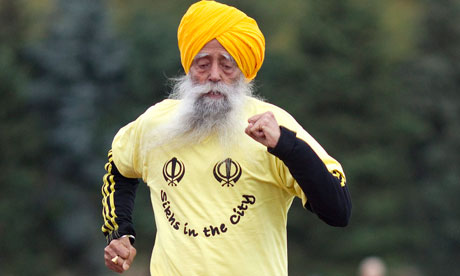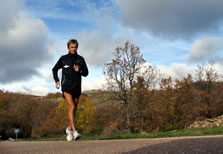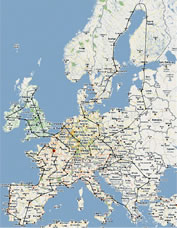http://www.motherearthnews.com/natural-health/strengthen-immune-system-z10m0vau.aspx#axzz2LMpo5YPL
12 Strategies to Strengthen Your Immune System
Bolster your immune system naturally with these easy tips!
 |
Eating a variety of colorful vegetables is just one easy (and delicious!) way to naturally strengthen your immune system.
PHOTO: ISTOCKPHOTO
|
Infections are as inevitable as death and taxes. You spend your first years catching (or being caught by) colds, influenza and strep throat. You sniffle, scratch, cough, vomit, ache, sweat and shiver. Your immune system remembers the microbes it has encountered and protects you the next go around. At the other end of life, your immune system wearies from years of fighting. In that great expanse of active, productive life in between, you still get colds and flus and “stomach bugs.” You may wonder why you are sick more or less often than your partner, co-workers and neighbors. You may wonder why one person hacking on the airplane successfully sickens the passenger to his right but not the one to his left. The answer is that not all immune systems function alike. A number of factors affect immune system health. Some you can’t control: The very young and the very old are vulnerable. Surgery and wounds give microbes a chance to sneak into the inner sanctum. Other risks include chronic disease, poverty, stress, living with lots of other people (dormitories, low-income housing), and drinking tap water (with its local microbes) in many foreign countries. Fortunately, there are ways you can strengthen your immune system.
1: Eat Like Peter Rabbit. Malnutrition impairs immune function. French fries, soft drinks and bourbon don’t build strong white blood cells either. No, it’s those virtuous, self-righteous diets high in fruits, vegetables and nuts that promote immune health, presumably because they’re rich in nutrients the immune system requires. Adequate protein intake is also important; the source can be plant or animal.
Medicinal mushrooms such as shiitake, maitake and reishi contain beta-glucans (complex carbohydrates) that enhance immune activity against infections and cancer and reduce allergies (cases of inappropriate immune system activity). While studies have focused on purified mushroom extracts, fresh shiitake and maitake (also called “hen of the woods”) mushrooms are delicious sautéed in a little olive oil.
One substance to avoid is simple sugar. Brigitte Mars, herbalist and author of The Desktop Guide to Herbal Medicines, notes that sugary foods and juices impair immune function; research bears her out.
If you’re a new mother, breast milk provides essential nutrients and immune system components to your developing child. Compared with formula-fed babies, those nourished at the breast have fewer serious infections.
2: Stress Less. When you’re stressed, your adrenal glands churn out epinephrine (aka, adrenaline) and cortisol. While acute stress pumps up the immune system, grinding long-term duress taxes it. For instance, psychological stress raises the risk for the common cold and other viruses. Less often, chronic stress can promote a hyper-reactive immune system and aggravate conditions such as allergies, asthma and autoimmune disease.
While most of us can’t move into a spa, we can learn to save our stress responses for true emergencies and not fire them up over stalled traffic, bad hair days and aphids on the begonias. Stress-reducing activities such as meditation produce positive changes in the immune system. Massage has shown to improve immune function in studies of Dominican children with HIV. Quiet music can aid recovery from everyday hassles and may therefore buttress immune function.
3: Move Your Body. Moderate exercise discharges tension and stress and enhances immune function. In a 2006 study, researchers took 115 obese, sedentary, postmenopausal women and assigned half of them to stretching exercises once a week and the other half to at least 45 minutes of moderate-intensity exercise five days a week. At the end of the year-long study, the stretchers had three times the rate of colds as the moderate-exercise group.
4: Sleep Soundly. Sleep is a time when growth-promoting and reparative hormones knit up the raveled sleeve of daily life. Sleep deprivation activates the stress response, depresses immune function and elevates inflammatory chemicals (which cause you to feel ill).
Chronic sleep deprivation raises the risk of the common cold. Mothers whose small children interrupt their sleep have more respiratory infections, particularly if those wee ones go to day care. In one study, after researchers inoculated volunteers’ noses with cold viruses (a reward was involved), men and women who habitually slept less than seven hours a night were almost three times more likely to develop a cold than those who slept eight hours or more.
5: Socialize More. People with richer social lives enjoy better health and longevity than loners do. You may think that the more people you interact with, the more chances you have for picking something up. Not so. Again, researchers blew cold viruses up people’s noses and sent them into the world. Compared with the lone wolves, the social butterflies were less susceptible to developing common colds, and, if they did get sick, they had fewer symptoms for a shorter period of time.
Many of us count furred and feathered companions as friends, and it turns out they do us a world of good. Animals such as dogs and horses get us outside exercising. Stroking an animal stirs feelings of well-being, lowers blood pressure and, according to recent research, boosts the immune system. Researchers assigned college students to pet either a stuffed dog or a live dog. Those who petted a real dog had a significant increase in levels of salivary IgG, an antibody (immune protein) that fights infection. Those who petted the stuffed dog just felt silly.
6: Make more love. While having lots of friends is healthy, science also shows that intimate, sexual relationships have immune system perks. Michael Castleman, renowned health writer and publisher of Great Sex After 40, writes, “A 2004 study shows that the close contact of lovemaking reduces the risk of colds.” Specifically, this study found that college students who had sex once or twice a week had 30 percent more salivary IgA antibody than those who had sex infrequently.
7: Shun Tobacco Smoke. Tobacco smoke triggers inflammation, increases respiratory mucus, and inhibits the hairlike projections inside your nose (cilia) from clearing that mucus. Children and adults exposed to tobacco smoke are more at risk for respiratory infections, including colds, bronchitis, pneumonia, sinusitis and middle ear infections.
8: Consume Friendly Bacteria. Beneficial microorganisms colonize our intestinal, lower urinary and upper respiratory tracts. They outcompete bad “bugs” and enhance immune function. You can consume such bacteria in the form of live-cultured products such as yogurt, sauerkraut and kimchi. Probiotic supplements, available at natural food stores, may reduce the risk of antibiotic-induced diarrhea, viral diarrhea, vaginitis and respiratory infections.
9: Expose Yourself. Vitamin D plays a number of roles in promoting normal immune function. Vitamin D deficiency correlates with asthma, cancer, several autoimmune diseases (e.g., multiple sclerosis), and susceptibility to infection (including viral respiratory infections). One study linked deficiency to a greater likelihood of carrying MRSA (methicillin-resistant Staphylococcus aureus) in the nose.
Unfortunately, nearly one-third of the U.S. population is vitamin D deficient. Because few foods contain much vitamin D, your best bet is to regularly spend short periods of time in the sun (without sunscreen), and to take supplements in northern climes during the colder months. Guidelines for the Recommended Daily Allowance (RDA) of vitamin D, currently set at 400 IU/day, are being revised. Experts predict that the new RDA will be about 1,000 IU/day (25 ug/day).
10: Choose Vitamin and Mineral Supplements Wisely. Studies link deficiencies of zinc, selenium, folic acid, and vitamins A, B6, C, D and E to reduced immune function. But scientists have yet to pinpoint exact levels of these nutrients for optimal immune function, much less whether dietary supplementation really helps the average, well-fed American. For instance, research on vitamin C for prevention and treatment of the common cold has been inconclusive. Some micronutrients, notably vitamin A, can be toxic in overdose. Excessive levels of zinc paradoxically suppress immune function. A varied, plant-based diet and a good multivitamin supplement should meet your needs.
11: Immunize Yourself. Routine vaccinations have had a huge impact on reducing, and in many cases nearly eradicating, a number of infectious diseases. Most immunizations occur during childhood. Vaccinations for adults to consider include yearly influenza vaccines, tetanus boosters, the shingles vaccine for people 60 and up, and the pneumococcus vaccine for people over the age of 65. For more information, check with the Centers for Disease Control.
12: Familiarize Yourself With Immune-Enhancing Herbs. A long list of medicinal plants contain chemicals that enhance immune system activity, including echinacea, eleuthero (also called Siberian ginseng), ginseng (Asian and American), astragalus, garlic, and shiitake, reishi and maitake mushrooms.
Garlic is the favorite choice of many. In addition to boosting the immune system, it’s anticancer and antimicrobial against a variety of bacteria, viruses, fungi and parasites. Key ingredients don’t survive cooking, so add a clove or two of raw, minced garlic to meals just before serving.
When someone in my family sniffles, I make an immune soup based on a recipe Brigitte Mars shared with me years ago:
Pretend you’re making chicken soup. Sauté onions, shiitake mushrooms and chicken, adding just enough water to keep the chicken from drying out.
Remove the chicken when it’s cooked and set aside. Add fresh vegetables such as carrots and celery. Cover with plenty of water. Toss in three or four astragalus roots (the pressed roots, available in natural foods stores or from online herb retailers such as Mountain Rose Herbs and Pacific Botanicals). Toward the end of cooking, add Italian seasonings (thyme, rosemary, oregano), which are tasty and antimicrobial, and the chopped, cooked chicken. Before serving, add fresh, pressed garlic (one to two cloves per person) and remove the astragalus roots.









